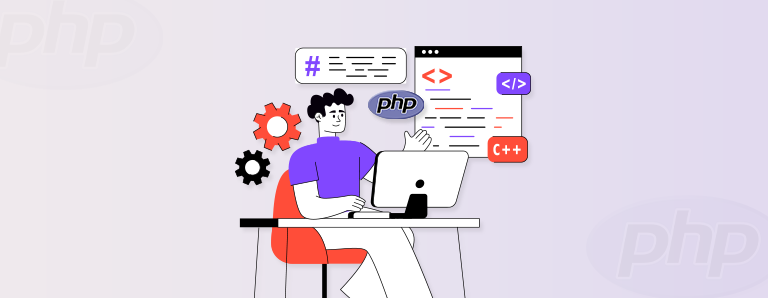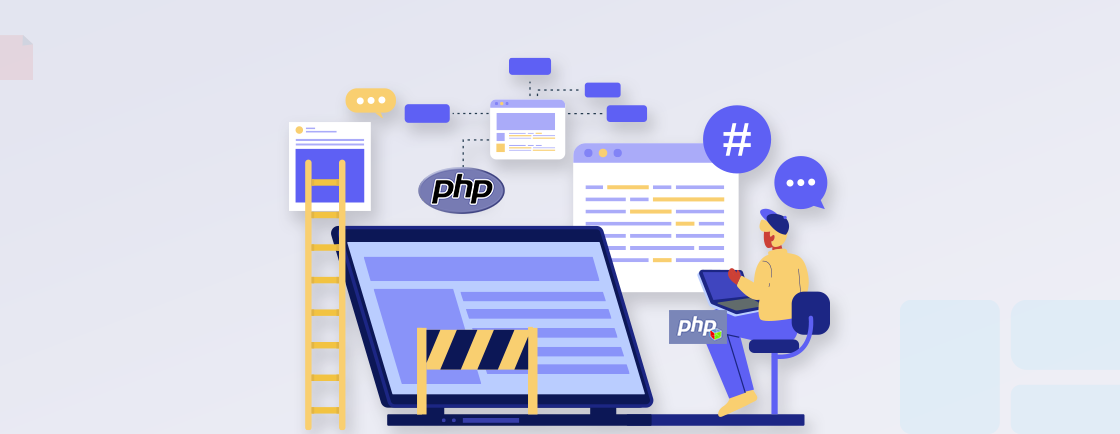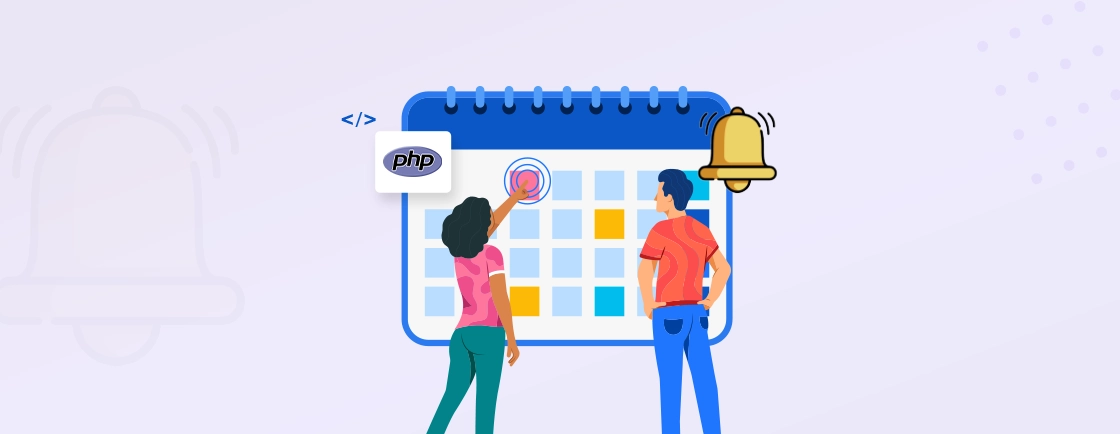Table of Contents
Nowadays, on mobile apps, everyone focuses on how it looks and feels because that dictates the user experience. But the backend of an app is equally as important, if not more. It drives every tap, swipe, and notification. So you need to choose the right fuel for that engine to make a world of difference, and PHP is one of the best options for building robust mobile backends and even powering PHP for desktop applications.
PHP has robust frameworks, lightning-fast performance, and immense community to take the backend of your mobile app to the next level. Experts can even go beyond simple CRUD operations and explore more advanced functionalities. That includes push notifications, real-time chat, and offline data synchronization.
In this blog, we’ll see everything you need to know about PHP for mobile app backend development, starting with the “Why?”. So, let’s begin.
Why Use PHP for Mobile App Backend Development?
PHP is a server-side scripting language known for its flexibility, ease of use, and wide support across various platforms and databases. PHP handles tasks such as accessing databases, processing form data, and managing session tracking.
Additionally, it can be embedded into HTML code or used in combination with various web template systems, content management systems, and web frameworks.
From its ease of use and cost-effectiveness to its cross-platform compatibility and large community support, PHP is quite beneficial for mobile app development. Here are numerous advantages that show why:
Easy to Learn and Use
PHP’s accessibility for mobile app backend development goes beyond just its syntax similarity to other languages. Here’s why learning and using PHP for mobile apps is quite easy:
- Intuitive syntax: PHP’s logic and structure are easy to grasp, even for those new to programming. It avoids excessive complexity and uses clear, human-readable constructs.
- Error handling: Comprehensive error messages and debugging tools provide valuable guidance, helping beginners identify and fix issues quickly.
- Interactive tutorials and courses: Numerous interactive platforms and online courses offer engaging learning experiences catering to various learning styles and preferences.
- PHP’s modular structure: You can learn the language incrementally, starting with basic syntax and gradually progressing to more advanced concepts.
- Focus on core functionalities: Mobile app backends often require a subset of PHP’s overall capabilities, making it easier to master the relevant features.
- Transferable skills: Knowledge gained from learning PHP can be applied to other areas of web development, expanding your skillset.
You see, when it comes to mobile app backend development, PHP’s ease of learning and use isn’t just about the language itself. It’s also about the supportive ecosystem and resources available.
Cost-effective
When it comes to mobile app development, budget is a crucial factor. PHP shines in this arena by offering several advantages that translate to significant cost savings:
- No licensing fees: Unlike some proprietary backend technologies with hefty licensing costs, PHP is freely available, eliminating a major financial barrier to entry.
- Community-driven innovation: The open-source nature fosters constant development and improvement, ensuring you benefit from the latest advancements without incurring additional expenses.
- Competitive developer rates: The widespread adoption of PHP leads to a large pool of skilled developers, driving competition and keeping rates more affordable compared to niche languages.
- Pre-built functionalities: A vast ecosystem of ready-made libraries and modules exist for various functionalities, eliminating the need for expensive custom coding.
- Lower maintenance costs: The open-source nature encourages community contributions, leading to readily available updates and bug fixes, reducing the need for expensive in-house maintenance.
- Cost-effective scaling: PHP’s flexible architecture and efficient resource utilization allow your backend to scale seamlessly without incurring significant infrastructure expenses.
- Future-proof technology: Continuous community contributions and framework updates ensure your PHP backend stays current and relevant. That reduces the need for costly technological overhauls.
Remember, cost-effectiveness is not just about initial development costs. PHP’s advantages translate to savings throughout the entire mobile app lifecycle, from development and launch to maintenance and scaling.
Cross-platform Compatibility
Mobile apps work in a multi-device landscape. The target audience uses different platforms, including Android and iOS. So, reaching them requires a backend technology with flexibility. PHP shines in this arena with its exceptional cross-platform compatibility, offering the following benefits:
- Seamless operation: PHP runs flawlessly on various operating systems and web servers, including Windows, Linux, macOS, and more.
- No platform-specific limitations: You can develop a single backend that works across different mobile platforms, like Android, iOS, and Windows Phone, without needing separate codebases for each.
- Diverse integrations: PHP seamlessly integrates with various databases, like MySQL, PostgreSQL, and SQLite, offering flexibility and scalability for your app’s data needs.
- API-driven communication: PHP excels at interacting with diverse APIs, enabling your app to connect with various services and functionalities regardless of the platform.
- Faster iterations and testing: This streamlined approach allows for faster prototyping, testing, and iteration, enabling you to quickly refine your app and adapt to user feedback.
- Improved maintainability: Maintaining a single codebase is easier and more efficient, reducing long-term maintenance costs and complexities.
PHP’s cross-platform compatibility is more than just a technical advantage; it’s a strategic asset for mobile app owners and developers. It opens doors to wider audiences, simplifies development, and fosters a future-proof approach.
Large Community Support
Collaboration and support are quite important in mobile app development. PHP boasts a vibrant and active community that offers a wealth of resources and assistance for mobile backend development, making it a truly empowering choice.
- Extensive documentation: The official PHP documentation is a comprehensive and constantly updated resource, providing detailed information on every aspect of the language.
- Tutorials and Courses: Online platforms and websites offer interactive tutorials and courses tailored to mobile backend development with PHP, catering to various learning styles and preferences.
- Community-driven knowledge bases: Blogs, forums, and Q&A websites act as bustling hubs for sharing knowledge, troubleshooting, and finding answers to even the most niche questions.
- Active forums and chat rooms: Engage with other developers, share experiences, and collaborate on projects, fostering learning and innovation.
- Mentorship and guidance: Experienced developers in the community offer valuable mentorship and guidance to newcomers, accelerating their learning curve and skill development.
- Constant evolution and improvement: The PHP community is a driving force behind ongoing development and innovation, ensuring the language stays relevant and adaptable to new technologies and trends.
- Rapid troubleshooting and solutions: The active community ensures that common challenges and issues can be quickly addressed and resolved, minimizing downtime and project delays.
In conclusion, PHP’s large and active community is not just a support network; it’s a vibrant ecosystem that fuels learning, innovation, and problem-solving. This translates to faster development cycles, better quality apps, and a future-proof approach to mobile backend development.
Make sure you choose the right backend technology depending on your specific project needs. To make the choice easier, you can opt for PHP development services that bring cost-effectiveness, cross-platform compatibility, and expert support to ensure the best results for your mobile app development.
How Does PHP Work for Mobile App Backend Development?
Earlier, PHP wasn’t exactly the first choice for backend development in mobile apps. But over time, its various functions have made PHP one of the best options for this purpose.
So, let’s see how PHP works for mobile app backend development:
Creating API
APIs are the lifeblood of mobile app communication with the backend. PHP, with its powerful frameworks and community support, excels in crafting robust and efficient APIs for your mobile app.
Let’s see how PHP creates APIs for mobile app development:
Popular frameworks like Laravel provide built-in tools and libraries for creating RESTful APIs, the preferred architecture for mobile app communication.
- Design API endpoints and methods according to the application’s needs.
- Generate API documentation outlining the format of requests and responses, methods of authentication, and potential error codes.
- Utilize secure authentication measures like OAuth or API keys to manage access to the API.
- Manage versioning to ensure compatibility with previous versions and allow users time to transition to newer versions.
- Conduct comprehensive testing of the APIs to ensure functionality, security, and performance for seamless integration with the mobile app.
PHP helps you build APIs that seamlessly connect your mobile app to the backend, enabling a smooth user experience and optimal performance.
Connecting to Databases
With PHP, you can connect your mobile app with powerful databases to ensure smoother data flow and efficient operations. Let’s see how PHP handles this crucial task:
- Establish a connection: Use PHP’s database connection functions like mysqli_connect or PDO to connect to the database server.
- Select the database: After connecting, specify the database to be used with the database selection function like mysqli_select_db or PDO::query.
- Execute queries: Utilize PHP’s query execution methods such as mysqli_query or PDO::query to perform database operations like insert, update, delete, or retrieve data.
- Handle results: Process and handle the results obtained from the executed queries using PHP functions like mysqli_fetch_assoc, mysqli_fetch_array, or PDOStatement::fetch.
PHP frameworks like Laravel can help you interact with diverse databases to ensure secure, efficient, and scalable data management for your mobile app.
Handling User Authentication
User authentication ensures that only authorized users access your valuable data and functionalities. To that end, PHP offers robust features and tools to build secure and user-friendly authentication systems. Here’s how it goes:
- Verify user credentials using secure methods like password hashing and salting.
- Implement two-factor authentication for an extra layer of security.
- Manage user sessions securely using techniques like session tokens and CSRF protection.
- Restrict access to sensitive user data through role-based access control (RBAC) mechanisms.
Frameworks empower you to build robust, secure, and user-friendly authentication systems. That helps protect your app from unauthorized access, ensures user data privacy, and builds trust with your users.
Managing Push Notifications
Push notifications keep users informed and engaged with your app even when it’s not open, driving user engagement and retention. And as always, the PHP frameworks take care of this operation through push notification services like Firebase Cloud Messaging (FCM) and AWS SNS.
Here’s what you need to do:
- Understand user preferences: Prioritize user notification preferences based on their interaction with the app, ensuring relevant and personalized push notifications.
- Utilize segmentation: Segment your user base to send targeted push notifications, increasing the likelihood of user engagement.
- Optimize delivery timing: Schedule push notifications at optimal times based on user activity patterns, preventing disruptions and improving response rates.
- Provide clear value: Craft concise and compelling messages that offer value to users, encouraging them to interact with the notification.
Make sure you regularly analyze push notification performance metrics to refine your strategy and enhance user engagement.
Beyond these functionalities, PHP can handle complex business logic, manage image uploads, integrate with payment gateways, and much more. The possibilities are vast, and PHP’s versatility and flexibility make it a powerful tool for building robust and scalable mobile app backends.
What are the Best Practices for Using PHP in Mobile App Backend Development?
When it comes to using PHP for mobile app backend development, there are some practices that you should keep in mind. These practices not only ensure a smoother and more efficient development process but also contribute to the overall success and security of the app.
Use Frameworks
Frameworks like Laravel offer pre-built components, libraries, and best practices, significantly reducing development time and ensuring secure and efficient backend systems.
- Choose the right framework: Evaluate the project requirements and select a suitable PHP framework like Laravel or Symfony based on the app’s complexity and scalability needs.
- Set up the framework: Install the chosen framework and configure it according to the app’s specifications, ensuring compatibility with the selected databases and other technology stack components.
- Utilize built-in features: Leverage the built-in functionalities of the framework for tasks such as routing, authentication, and database interactions to expedite development and maintain code consistency.
Make sure you adhere to the framework’s coding standards, follow MVC architecture, and utilize reusable components to streamline development and facilitate code maintenance.
Secure Your Code
Here are a few practices that will help secure your backend code and prevent vulnerabilities such as SQL injection, cross-site scripting, and data breaches:
- Implement proper input validation to ensure that only valid and safe data is processed by the application.
- Utilize encryption techniques for secure transmission and storage of sensitive data, including SSL/TLS for communication and hashing for password storage.
- Implement secure user logins, sessions, and permissions to protect sensitive data.
Also, regularly update libraries, frameworks, and dependencies to patch security flaws and stay protected against emerging threats.
Optimize for Performance
Performance is key in mobile applications. Here are a few ways to optimize the performance of a mobile app:
- Utilize Caching: Implement caching mechanisms to store frequently accessed data, reducing server load and improving response times.
- Code Optimization: Streamline code by removing redundant operations, optimizing database queries, and minimizing file sizes to enhance overall performance.
- Load Balancing: Distribute app workloads across multiple servers to prevent overloading and ensure consistent performance, especially during peak usage periods.
- Minimize External Requests: Reduce reliance on external resources by consolidating files, scripts, and data to limit network requests and boost app responsiveness.
I suggest you focus on writing concise and efficient code to minimize resource consumption.
Finally, maintain your code by conducting regular code reviews and refactoring to improve efficiency and readability. And automate testing and deployment processes to streamline code maintenance.
To Conclude
The backend is considered the brain of the mobile app. It controls the operation and delivery of valuable functionalities to the users. That includes data management, user authentication and authorization, API development and communication, and more.
So, you need the best server-side language for the backend development, and PHP is one of the perfect choices. It’s easy to use and cost-effective and offers cross-platform compatibility and large community support. That’s why some of the prominent mobile apps on both Android and iOS use PHP for backend development.
If you want a reliable, scalable, and cost-effective backend for your mobile app, hire PHP developer today!
FAQs on PHP for Mobile App Backend Development
Do I need a backend for every mobile app?
Not always. Simple apps (e.g., calculators) can work offline. But most dynamic apps (social networks, eCommerce) require a backend for data processing and storage.
What’s the difference between REST and GraphQL APIs?
REST uses fixed endpoints for data, while GraphQL lets clients request specific fields, reducing over-fetching. GraphQL is flexible but may be complex for simple apps.
How does a PHP backend connect to a mobile app?
The app sends HTTP requests to PHP endpoints (e.g., api.example.com/login), which process data and return JSON responses for the app to display.
How scalable is a PHP backend for mobile apps?
With proper architecture (load balancing, caching with Redis, optimized databases), PHP can scale to millions of users (e.g., Facebook initially used PHP).
How do I handle user authentication?
Implement OAuth 2.0 (Google, Facebook login), JWT tokens, or services like Auth0 or Firebase Authentication for secure sign-ins.
Master PHP Web Development
Access expert guides and tips to enhance your PHP programming capabilities.





